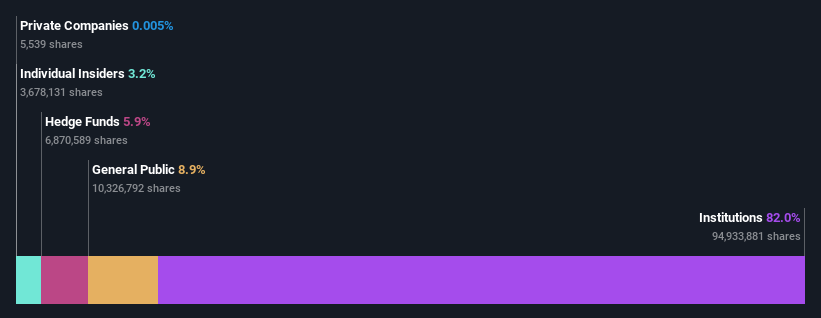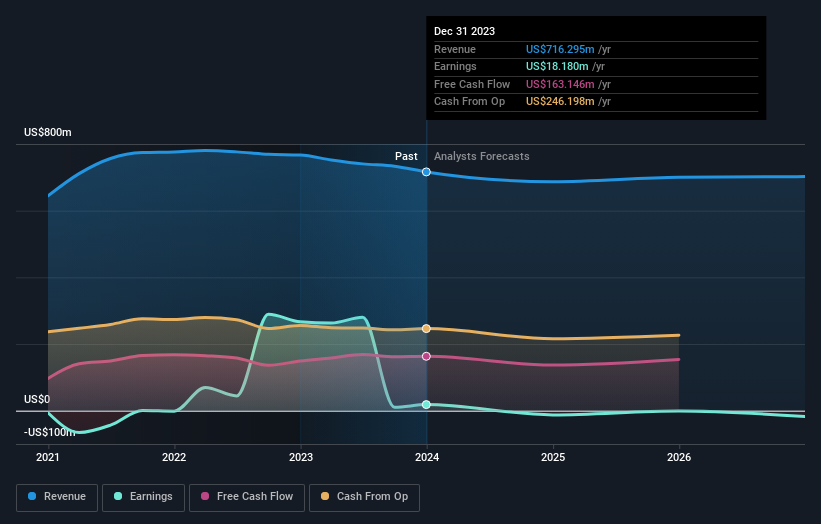Institutional investors may adopt severe steps after Chegg, Inc.'s (NYSE:CHGG) latest 11% drop adds to a year losses
Key Insights
Significantly high institutional ownership implies Chegg's stock price is sensitive to their trading actions
The top 12 shareholders own 50% of the company
Analyst forecasts along with ownership data serve to give a strong idea about prospects for a business
A look at the shareholders of Chegg, Inc. (NYSE:CHGG) can tell us which group is most powerful. With 82% stake, institutions possess the maximum shares in the company. Put another way, the group faces the maximum upside potential (or downside risk).
And institutional investors saw their holdings value drop by 11% last week. Needless to say, the recent loss which further adds to the one-year loss to shareholders of 50% might not go down well especially with this category of shareholders. Also referred to as "smart money", institutions have a lot of sway over how a stock's price moves. As a result, if the downtrend continues, institutions may face pressures to sell Chegg, which might have negative implications on individual investors.
Let's take a closer look to see what the different types of shareholders can tell us about Chegg.
View our latest analysis for Chegg
What Does The Institutional Ownership Tell Us About Chegg?
Many institutions measure their performance against an index that approximates the local market. So they usually pay more attention to companies that are included in major indices.
Chegg already has institutions on the share registry. Indeed, they own a respectable stake in the company. This suggests some credibility amongst professional investors. But we can't rely on that fact alone since institutions make bad investments sometimes, just like everyone does. If multiple institutions change their view on a stock at the same time, you could see the share price drop fast. It's therefore worth looking at Chegg's earnings history below. Of course, the future is what really matters.
Institutional investors own over 50% of the company, so together than can probably strongly influence board decisions. Our data indicates that hedge funds own 5.9% of Chegg. That catches my attention because hedge funds sometimes try to influence management, or bring about changes that will create near term value for shareholders. The company's largest shareholder is The Vanguard Group, Inc., with ownership of 9.3%. For context, the second largest shareholder holds about 9.3% of the shares outstanding, followed by an ownership of 5.9% by the third-largest shareholder. Additionally, the company's CEO Daniel Rosensweig directly holds 1.7% of the total shares outstanding.
Looking at the shareholder registry, we can see that 50% of the ownership is controlled by the top 12 shareholders, meaning that no single shareholder has a majority interest in the ownership.
Researching institutional ownership is a good way to gauge and filter a stock's expected performance. The same can be achieved by studying analyst sentiments. There are plenty of analysts covering the stock, so it might be worth seeing what they are forecasting, too.
Insider Ownership Of Chegg
While the precise definition of an insider can be subjective, almost everyone considers board members to be insiders. The company management answer to the board and the latter should represent the interests of shareholders. Notably, sometimes top-level managers are on the board themselves.
I generally consider insider ownership to be a good thing. However, on some occasions it makes it more difficult for other shareholders to hold the board accountable for decisions.
We can report that insiders do own shares in Chegg, Inc.. In their own names, insiders own US$29m worth of stock in the US$898m company. Some would say this shows alignment of interests between shareholders and the board. But it might be worth checking if those insiders have been selling.
General Public Ownership
The general public, who are usually individual investors, hold 8.9% stake in Chegg, which represents a relatively small class of owners. We would usually expect a higher level of ownership by the general public. With such a small collective position, it may be difficult for small holders to influence the company.
Next Steps:
It's always worth thinking about the different groups who own shares in a company. But to understand Chegg better, we need to consider many other factors. For example, we've discovered 2 warning signs for Chegg (1 is concerning!) that you should be aware of before investing here.
If you would prefer discover what analysts are predicting in terms of future growth, do not miss this free report on analyst forecasts.
NB: Figures in this article are calculated using data from the last twelve months, which refer to the 12-month period ending on the last date of the month the financial statement is dated. This may not be consistent with full year annual report figures.
Have feedback on this article? Concerned about the content? Get in touch with us directly. Alternatively, email editorial-team (at) simplywallst.com.
This article by Simply Wall St is general in nature. We provide commentary based on historical data and analyst forecasts only using an unbiased methodology and our articles are not intended to be financial advice. It does not constitute a recommendation to buy or sell any stock, and does not take account of your objectives, or your financial situation. We aim to bring you long-term focused analysis driven by fundamental data. Note that our analysis may not factor in the latest price-sensitive company announcements or qualitative material. Simply Wall St has no position in any stocks mentioned.


